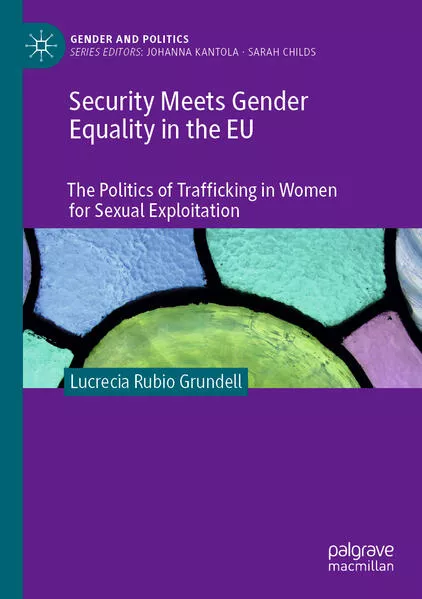
- Publikationen ca: 3
- Fragen & Antworten
Lucrecia Rubio Grundell
Lucrecia Rubio Grundell is a UNA4CAREER Postdoctoral Fellow in the Faculty of Political Science and Sociology, at the Universidad Complutense de Madrid, Spain. She is doctor in Political and Social Science by the European University Institute and has participated as a postdoctoral researcher in various other Universities, including l'Université libre de Bruxelles, in Brussels, and the Univerisdad Autónoma de Madrid. Her research interests lie in the intersection between human rights, gender, intersectionality, migration and sex work, on which she has published in journals such as the European Journal of Women's Studies or Social Politics.
Security Meets Gender Equality in the EU
This book explores the triangular dynamics of securitisation and desecuritisation that underpin the EU’s approach to trafficking in women for sexual exploitation. That is, the progressive securitisation of trafficking in women for sexual exploitation within the EU’s anti-trafficking policies and the existence of two distinct and competing approaches that coexist among feminist struggles against such trend and that largely follow the two opposing views that structure feminist debates on prostitution: a neo-abolitionist approach, on the one hand, that is increasingly defended from within EU institutions, and has therefore become increasingly entangled with the securitisation of trafficking in women; and a sex work approach, on the other hand, that has been largely relegated to the domains of academia and civil society.
Security Meets Gender Equality in the EU
This book explores the triangular dynamics of securitisation and desecuritisation that underpin the EU’s approach to trafficking in women for sexual exploitation. That is, the progressive securitisation of trafficking in women for sexual exploitation within the EU’s anti-trafficking policies and the existence of two distinct and competing approaches that coexist among feminist struggles against such trend and that largely follow the two opposing views that structure feminist debates on prostitution: a neo-abolitionist approach, on the one hand, that is increasingly defended from within EU institutions, and has therefore become increasingly entangled with the securitisation of trafficking in women; and a sex work approach, on the other hand, that has been largely relegated to the domains of academia and civil society.
Security Meets Gender Equality in the EU
This book explores the triangular dynamics of securitisation and desecuritisation that underpin the EU’s approach to trafficking in women for sexual exploitation. That is, the progressive securitisation of trafficking in women for sexual exploitation within the EU’s anti-trafficking policies and the existence of two distinct and competing approaches that coexist among feminist struggles against such trend and that largely follow the two opposing views that structure feminist debates on prostitution: a neo-abolitionist approach, on the one hand, that is increasingly defended from within EU institutions, and has therefore become increasingly entangled with the securitisation of trafficking in women; and a sex work approach, on the other hand, that has been largely relegated to the domains of academia and civil society.


